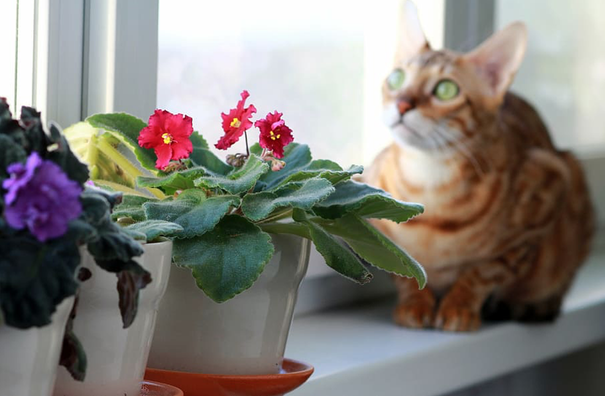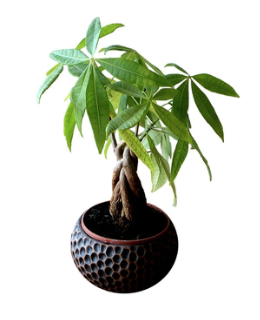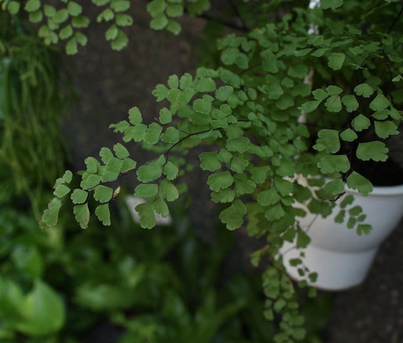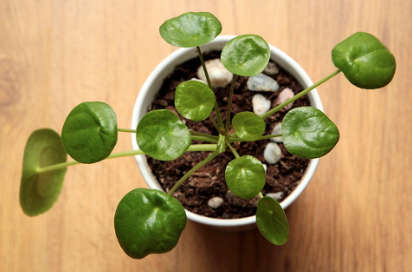
-Pam Scott-
Fifth Season Gardening has an impressive array of tropical house plants ready for you to choose from for brightening and humidifying your home. The most frequently asked question we hear from our tropical plant customers is, “Which houseplants are safe for pets?” As the mother of two precocious boxer puppies, as well as the mother of close to 50 house plants, I know that keeping them all safe and healthy is a priority.
Most cats and dogs eat plant material at some time. It’s unclear why primarily carnivorous animals do this. Occasionally this behavior is attributable to easing intestinal distress, expelling parasites or adjusting a nutritional imbalance but, for the most part this behavior appears to be a carryover trait inherited from their wild ancestors, they have fun doing it. While dogs and cats enjoy an occasional grass or catnip snack, their digestive systems are not fully suited to handle large amounts of chlorophyll filled plant matter. Most tropical plants eaten in quantity, no matter what the toxicity level, will make your pet ill.

Tropical plants survive in the wild by offering varying degrees of toxicity in their leaves, roots, flowers and berries to hungry animals. Some plants are mildly toxic, giving grazing animals some stomach upset or oral irritation, some plants are poisonous with potentially fatal results. Pets, as well as humans, all react differently to eating plant matter. Your pet may have allergies that could be triggered by ingesting a house plant thought to be safe. If you are the parent of a plant nibbler its best to keep your plants safe from your pets and your pets safe from your plants by hanging them, putting them on plant stands or placing them high on a shelf. Always clean up plant debris from the floor. If you need to treat your plants for bugs always use non toxic insecticides such as Safer Insecticidal Soap or Horticultural oil when appropriate.
We have put together a list of easy care pet safe plants that you may want to consider bringing into your home. Most of these plants can be found year round at Fifth Season Gardening. Consulting your vet or ASPCA.org for a comprehensive list of toxic and non toxic plants before you make a tropical house plant purchase will help to ensure your pet’s safety.
Non toxic tropical house plants

- African violet (Saintpaulia)
- Airplants (Tillandsia )
- Aspidistra
- Bromeliads (Tillandsia)
- Christmas cactus (Schlumbergera)
- Ferns
- Pteris fern
- Button fern (Pellaea rotundifolia)
- Maidenhair fern (Adiantum)
- Boston fern (Nephrolepis)
- Birds nest fern (Asplenium)
- Staghorn fern (Platycerium)
- Fittonia
- Herbs
- Basil
- Cilantro
- Mint
- Parsley
- Tarragon
- Thyme
- Hoya Carnosa
- Money tree (Pachira)
- Opuntia Cactus
- Palms
- Areca (Dypsis)
- Cat Palm (Chamaedorea cataractarum)
- Neanthe Bella (Chamaedorea)
- Majesty (Ravenea rivularis)
- Ponytail (Beaucarnea)
- Peperomia
- Phalaenopsis Orchid
- Pilea

Pilea - Prayer Plant (Maranta)
- RattleSnake Plant (Calathea)
- Spider Plant (Chlorophytum)
- Succulents
- Burro Tail (Sedum margananum)
- Echevarria
- Hawarthia
- Sedum
- Spider Plant (Chlorophytum)
- Swedish Ivy (Plectranthus)
- Tradescantia zebrina
Stop by Fifth Season Gardening for all your house plants, plant hangers, plant stands, pest control, nutrients and all other indoor and outdoor gardening needs!

Nunya says
Tradescantia zebrina is definitely listed as toxic by the ASPCA to cats, dogs and horses